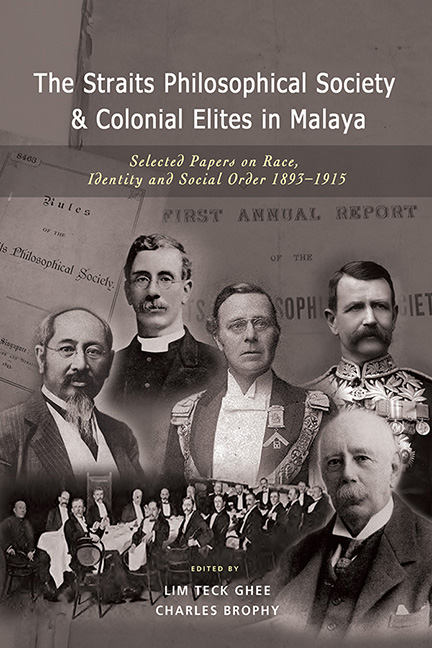 The Straits Philosophical Society and Colonial Elites in Malaya
The Straits Philosophical Society and Colonial Elites in Malaya 4 - The Doctrine of the Survival of the Fittest as Applied to Man
Published online by Cambridge University Press: 09 January 2024
Summary
Editors’ Note
Henry N. Ridley was a prominent botanist who played a central role in the cultivation of rubber in colonial Malaya. He was also a prolific scholar with a wide range of interests. According to Edward Salisbury, Ridley’s botanical publications numbered more than 350, apart from his books and numerous notes on medicine, zoology, ethnography, mineralogy and geology. As Sandra Khor Manickam has highlighted, Ridley was also important to colonial thinking about race in Malaya at the turn of the twentieth century. This is particularly evident in Ridley’s numerous contributions to the Society, many of which were concerned with questions of race and ideas of social Darwinism. In line with his scientific training, Ridley’s contributions are also notable for their particularly biological perspectives. In his 1900 paper he emphasized the role of the survival of the fittest in developing higher civilizations. He gave particular emphasis to the role of climate and environment in producing the conditions for civilization in Europe, and a corresponding lack of civilization in tropical regions. Yet, if Ridley saw race in particularly biological and environmental terms, he was also aware that societies could intervene to limit the process of the survival of the fittest through, for example, modern sanitation and medicine. Such developments according to Ridley resulted in a racial “weakness” which pitted the rights of the individual against the health of the race. As with many other of the Society’s papers, Ridley’s contributions were a critique of liberal individualism, and an argument for race-based thinking to become central to political life and colonial policy. “To improve the position of both at the same time”, he would argue, “is the future task of our legislators.”
Although the phrase “survival of the fittest” is now familiar to most persons, its meaning appears to have been often much misunderstood, and it is advisable to give some explanation of it before discussing it. The difficulty has lain in the word “fittest”, which does not signify the best of all possible forms of the organism, but merely the most suitable or best adapted for the conditions of existence in which the organism finds itself.
- Type
- Chapter
- Information
- The Straits Philosophical Society and Colonial Elites in MalayaSelected Papers on Race, Identity and Social Order 1893-1915, pp. 71 - 78Publisher: ISEAS–Yusof Ishak InstitutePrint publication year: 2023
